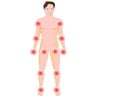Despite chronic pain, a study found that the majority of Canadians with arthritis are free of psychiatric disorders.

Flourishing mental health despite disabling chronic pain: Findings from a nationally representative sample of Canadians with arthritis
Go to source). More than three-quarters (76%) of these Canadians living with arthritis and debilitating chronic pain are free of all psychiatric disorders, including depression, and more than half (56%) are happy and in excellent mental health.
‘Over 75% of Canadians with arthritis and chronic pain have no psychiatric disorders, with over 50% reporting happiness and good mental health, revealing remarkable resilience.
#Arthritis, #Canadians, #Chronicpain
’





The definition of excellent mental health sets a very high bar. To be defined in excellent mental health, respondents had to achieve three things: - Almost daily happiness or life satisfaction in the past month
- High levels of social and psychological well-being in the past month
- Freedom from generalized anxiety disorder and depressive disorders, suicidal thoughts, and substance dependence for at least the preceding full year
Fuller-Thomson is the Director of the U of T Institute for Life Course and Aging and a Professor at the Factor-Inwentash Faculty of Social Work (FIFSW) and the Department of Family & Community Medicine.
Mental Well-being Triumphs
Consistent with earlier studies, this study found insomnia to be negatively associated with mental health.“These findings underscore the importance of health professionals asking about sleep problems, particularly as chronic pain can undermine the quality of sleep,” says co-author Denise Marshall, a recent graduate of U of T’s FIFSW.
“Among individuals with chronic pain, cognitive behavioral therapy or CBT has been shown to significantly reduce insomnia. CBT is an already established effective and relatively rapid treatment for depression and anxiety in the general population and among those with chronic pain.”
Those with a confidant were much more likely to be in complete mental health than those without a confidant (60% vs 8%, respectively).
Advertisement
“Although the exact mechanisms by which a confidant supports mental health are not fully understood, we hypothesize that the provision of emotional support can help enhance self-esteem and help the individual buffer general stress associated with the chronic pain.”
“The current research shifts away from a deficit-focused approach to mental health among individuals with arthritis, and instead uses a strengths-based perspective to explore factors associated with resilience in individuals with arthritis who are experiencing chronic and disabling pain.” says co-author Sally Abudiab, who also recently graduated from U of T’s FIFSW.
Reference:
- Flourishing mental health despite disabling chronic pain: Findings from a nationally representative sample of Canadians with arthritis - (https://journals.plos.org/plosone/article?id=10.1371/journal.pone.0291722)
Source-Eurekalert















